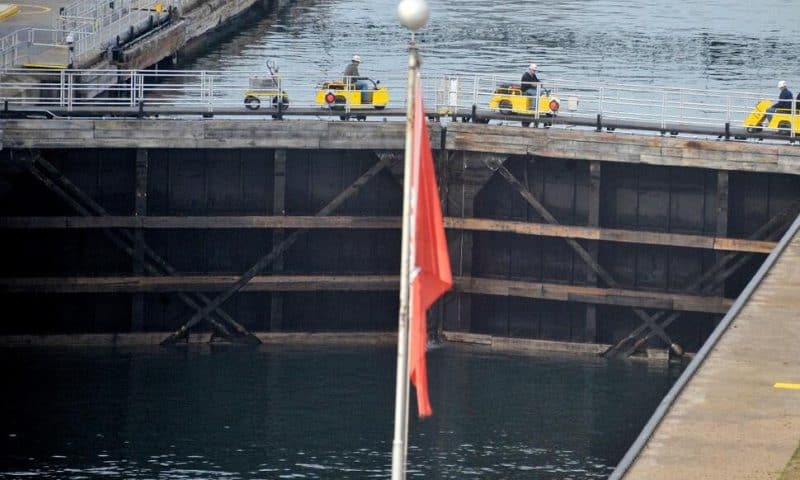President Joe Biden signed a large defense bill on Friday that includes a water bill that directs the Army Corps of Engineers on major infrastructure projects to improve navigation and protect against storms worsened by climate change
President Joe Biden signed a large defense bill on Friday that includes a water bill that directs the Army Corps of Engineers on major infrastructure projects to improve navigation and protect against storms worsened by climate change.
The biggest project by far this year is a $34 billion Texas coastal barrier featuring massive floodgates and other structures to protect the Houston region with its concentration of oil refineries and chemical plants, at risk during major hurricanes.
The Water Resources Development Act of 2022 also includes a $3.2 billion authorization for a new Soo Lock on the St. Marys River which connects Lake Superior with Lake Huron.
Nearly all U.S. iron ore is mined near Lake Superior, but to create steel and build cars, it needs to travel on large vessels through a single, aging Michigan lock that federal officials have called the Achilles’ heel of the North American industrial economy.
There are two locks operating but only one is big enough to handle the roughly 1,000 feet (305 meters) freighters the industry uses.
“Everything was built around water transport on the Great Lakes,” said Kevin Dempsey, president and CEO of a steel industry group. If the lock fails, it could upend industry and manufacturing, he said. Roads and rail aren’t workable alternatives.
After years of studies and planning, members of Congress push to include their preferred projects in the water bill, typically every two years. If they are successful, they tout the job creation and local benefits back in their districts. This water bill includes 25 project authorizations.
Versions of the new Michigan lock have been authorized by Congress before and it is already under construction. But the Army Corps said inflation, design changes and other factors have significantly increased its cost. This year Congress authorized the Corps to spend much more. Some of the money still needs to be allocated. Officials say the new lock should be finished in 2030.
The new Soo Lock is in Sault Ste. Marie on Michigan’s eastern Upper Peninsula, about 346 miles (556 kilometers) north of Detroit. The existing Poe Lock is growing older and Army Corps officials don’t want it to be a single point of failure for a critical supply chain.
“When you have steel components that are in the water for 50 years, they do tend to fatigue and deteriorate,” said Kevin McDaniels, deputy district engineer for the Army Corps Detroit District.
The Senate voted 83-11 earlier this month to pass the national defense bill. In addition to water infrastructure, it increases spending on defense programs and includes a Republican-favored measure to end COVID-19 vaccination mandates for U.S. service members. It passed the House with broad, bipartisan support.
The water bill also makes it easier for the Corps to shift toward using wetlands and other nature-based solutions to combat flooding.
“There is a lot in here that is important for our environment, our economy and for climate resilience,” said Amy Souers Kober, a spokesperson with American Rivers.
For example, when hurricanes hit, coastal protections can be built with climate change in mind, allowing designers to think about how much seas will rise when they make their plans.
There are numerous other provisions. The bill improves outreach with tribes, allows the Corps to focus more on water conservation in drought-prone areas and supports ecosystem restoration projects. In Michigan, it shifts more of the costs to the federal government for a project aimed at protecting the Great Lakes from invasive carp.

